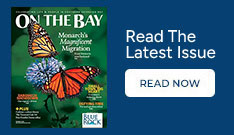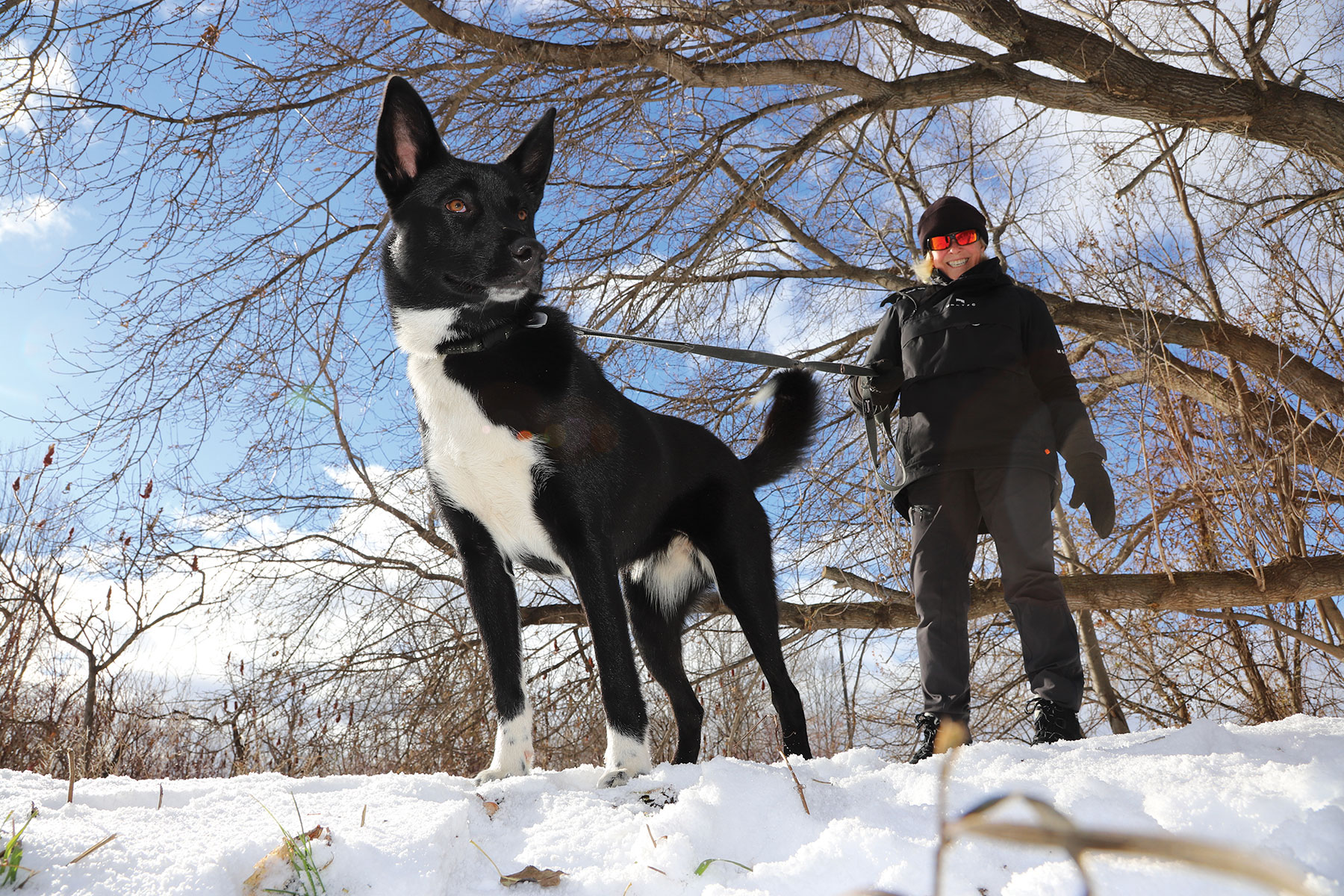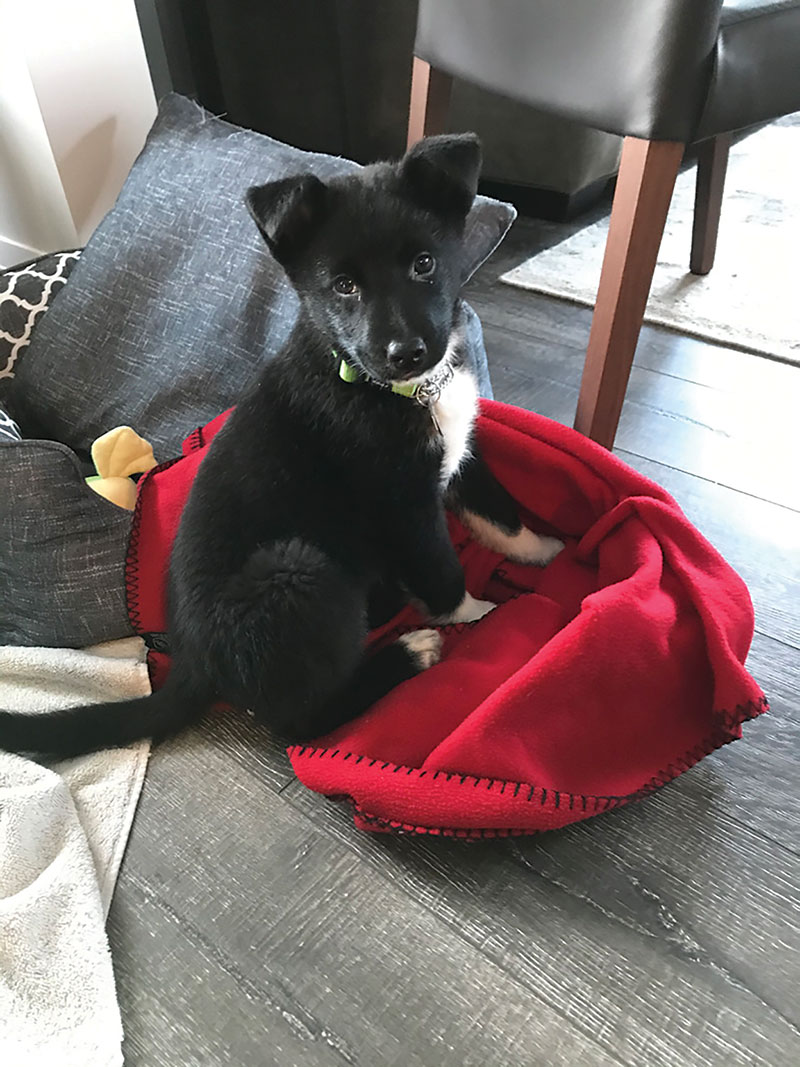by Dianne Rinehart // Photography by Roger Klein
On December 24th, 2020, the most wonderful gift I have ever received was born. I didn’t know it. I wouldn’t receive word from the Georgian Triangle Humane Society that I was chosen to adopt the amazing Daisy, a silky-soft black husky/shepherd mix with polka dot paws and a white tuxedo chest, until February 26th.
A day later, she was in my home, chewing on my shoes, my sofa, and my rattan chairs. No matter. Mere moments after she tentatively crept into her new home, she was so deeply embedded into my heart that I couldn’t imagine how I’d lived without her.

These are all people I never would have shared more than a nod and a “good morning” with, if that, if I didn’t have Daisy scurrying at my side. But with her, social boundaries melt away and ageism ceases to exist
I am not alone — in two ways.
The first is that I am among 3.7 million Canadians who felt compelled to adopt a cat or a dog during the pandemic, according to research commissioned by Purina. The second — and more important reason — is that with Daisy at my side I am never alone.
It’s not just that she is with me (and what an entertaining, waggish companion she is), it’s that when I am with her everyone wants to greet her — and then, with such ease, we begin to talk.
A woman describes her marriage breakup, and how she has escaped the city to move to Collingwood. Can we meet for drinks?
A young mother of two invites me into her home (not during the lockdown) for a glass of wine so our dogs can cavort in her living room during a rainstorm.
Twice, young men in cool cars have slowed down and given me a thumbs up as they’ve yelled through the car window,
“What a beautiful dog!”
These are all people I never would have shared more than a nod and a “good morning” with, if that, if I didn’t have Daisy scurrying at my side. But with her, social boundaries melt away and ageism ceases to exist.
And here’s a blessing: Did I mention that a few months after I adopted Daisy my marriage collapsed?
In the aftermath, I had to stay focused to take care of Daisy. She was a tiny puppy who simply wanted love, food, exercise, and excitement. I couldn’t let her down.
So, I set up a routine in which we both blossomed.
A dawn walk and a swim for her at Sunset Point, without fail. An off-leash walk in a forest or meadow somewhere between Meaford and Collingwood at mid-day. Sometimes, a trip up to Blue to walk the trails there, followed by a burger on a patio in the village, where the hostess and servers — and the guests! — shower her with love and attention.
Nightlife? Pshaw!
All spring, summer and fall, while the light held well into the evening, my neighbours and I met at about 6:30 at a green space on our street. As our dogs frolicked, we would share small talk, and bond.
And we also shared momentous things. One single woman quietly admitted she wouldn’t have any social life at all if it wasn’t for her dog.
As a new resident of Collingwood who arrived two months before the pandemic hit and had no time to make friends before the lockdown, I could share her pain — and relief that our four-legged companions had opened the world to so many friendships.
And that isn’t the half of it.
According to the Harvard Medical School, owning a dog can prompt you to be more physically active, help reduce stress, reduce blood pressure and heart rate. And this is key: a dog can help reduce feelings of loneliness.
How important is that?
Research finds that lonely people are prone to high blood pressure, heart disease, obesity, a weakened immune system, anxiety, depression, cognitive decline, Alzheimer’s disease, and even death.
Indeed, loneliness was catapulted into the news in 2018 when former U.K. prime minister Theresa May’s government named a minister for loneliness to create policies to fight the number one mental health issue facing the country. The government was spurred into action by studies that indicated that loneliness cost U.K. employers up to $3.5 billion annually.
Daisy saved me from all that — in a pandemic in a new town in a new single life.
Not bad for a ball of fluff that only weighed 10 pounds when I got her.
So, what can I tell you about Daisy besides the fact that she is as cute as stink?
First, she has taught me so many life lessons.
When another dog growls or lunges at her on the trail, she wags her tail harder. If that doesn’t work, she just walks on by. I love that!
She fights fair. If a dog or puppy is smaller than her, she never takes advantage.
She does not discriminate. Big or small, whatever breed, she is your best friend.
She always wants to play!
And loving? When anyone approaches, her silky ears drop down until she looks like Yoda. Then she leans into their legs and waits to be petted.
Her tail is my compass for navigating life. Due north, it is a beacon of happiness, bliss, and fearlessness.
Due south, especially when it is curled between her legs, I know she feels endangered, and so do I.
Most adorable of all is her behaviour when I am down. She doesn’t come and cuddle with me, like dogs starring in movies do. In fact, if she senses I’m upset, she flees the room. When I finally wander out to find her, she turns herself onto her back, puts her shiny white polka-dot paws to the sky and looks at me with big, brown, expressive eyes. “What are you waiting for?” she asks as I pull myself together. “It’s time for a tummy rub!”
Indeed, in life, it always is.
I don’t know how to describe our relationship.
But a cartoon I saw during the pandemic did so beautifully. It was a drawing of a dog and a human. They both had bubbles over their heads. The dog’s said: “Thank you for rescuing me.” The human’s said: “Thank you for rescuing me.”















